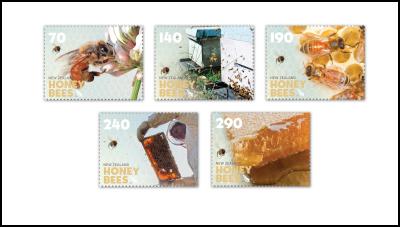Praise Bee – industrious insects get the stamp of approval
2 July 2013
Praise Bee –
industrious insects get the stamp of
approval

They’ve been celebrated in verse (by the likes of Emily Dickinson[1], William Blake[2] and Kahlil Gibran[3]) – in song (by the likes of Gloria Gaynor[4], Blake Shelton[5] and Owl City[6]) – and in popular culture (with spelling bees, ‘Buzzy Bees’ and Wellington’s own ‘Beehive’). But the humble bee stands poised to get a new tribute this week, with the release of a special set of postage stamps.
The Honey Bees stamp issue celebrates the industrious insects on the occasion of the 100th anniversary of the National Beekeepers' Association of New Zealand.
Honey bees, which are of European origin, have played a key role in New Zealand horticulture for over 150 years – pollinating essential crops and producing up to 12,000 tonnes of honey per annum, with as much as half of that being exported.
New Zealand Post’s stamps spokesman Simon Allison says the numerous species of native bees don’t make honey, prompting a Yorkshire-woman named Mary Bumby to bring the first honey bee hives to this country in 1839.
As Simon Allison explains, “Honey bees in this country are a sort of golden-amber colour, and shouldn’t be confused with the black and yellow striped bees you find in your garden, which are bumblebees.
“Bumblebees produce only a tiny quality of honey – enough for their own needs - and despite the similarity in names, have nothing to do with Mary Bumby. Entomology – and indeed etymology – can be very complex.
“Sadly honey bees in
New Zealand are under threat as a result of the Varroa mite.
This collectable stamp issue aims to raise awareness of the
immeasurably valuable role that honey bees play in this
country, and to do so by telling the story of how honey is
made,” Simon Allison said.
The 70c stamp depicts the first step in making honey - the gathering of nectar – a task carried out by ‘field bees’ which fly from flower to flower using their long tongues like straws to extract nectar. The field bees store that nectar in their ‘honey sacs’, which can weigh almost as much as the bee itself when full. The honey sacs contain enzymes which break down the complex sugars of the nectar into simpler sugars.
The $1.40 stamp shows field bees returning to the hive - where they empty the nectar from their sacs into the cells in the honeycomb nearest to the entrance. A single hive can house thousands of honey bees, mostly workers – plus the queen bee.
The $1.90 stamp shows young worker ‘house bees’ transferring nectar to the honey storage area inside the hive. Enzymes are added to the nectar, which is then further concentrated by house bees fanning their wings to create an air current which dries the nectar into honey. Once the honey has a water content lower than 20% the bees seal off the cell in the honeycomb with a wax cap.
The $2.40 stamp shows beekeepers removing the combs from the hives to harvest the honey. These combs are spun in a centrifuge to separate the honey without damaging the hives or hurting the bees.
The fifth and final stamp in the set – valued at $2.90 – shows a block of pure honey – which is then processed and packaged into the familiar jars and pottles we see on supermarket shelves.
The five gummed stamps are also available as a collectable miniature sheet, as first day covers and in a special presentation pack.
The Honey Bees stamp issue is available from Wednesday 3 July 2013 at PostShops, REAL Aotearoa stores, and online at www.nzpost.co.nz/honeybees or by phoning 0800 782 677.
(ends)


 ASB Bank: ASB Business Survey - The Impact Of Trump's Tariffs, According To Kiwi Businesses
ASB Bank: ASB Business Survey - The Impact Of Trump's Tariffs, According To Kiwi Businesses University of Auckland: Will Robots Help Older People Stay Sharp?
University of Auckland: Will Robots Help Older People Stay Sharp? Electricity Authority: Authority Confirms New Next-Gen Switching Service; Proposes Multiple Trading Relationships For Consumers
Electricity Authority: Authority Confirms New Next-Gen Switching Service; Proposes Multiple Trading Relationships For Consumers Mānuka Charitable Trust: Mānuka Charitable Trust Warns Global Buyers Of Misleading Australian Honey Claims
Mānuka Charitable Trust: Mānuka Charitable Trust Warns Global Buyers Of Misleading Australian Honey Claims  Engineering New Zealand: NZ Building System Needs Urgent Improvement
Engineering New Zealand: NZ Building System Needs Urgent Improvement GNS Science: Bioshields Could Help Slow Tsunami Flow
GNS Science: Bioshields Could Help Slow Tsunami Flow


